|
|
|
Sort Order |
|
|
|
Items / Page
|
|
|
|
|
|
|
| Srl | Item |
| 1 |
ID:
093920
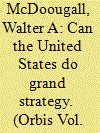

|
|
|
|
|
| Publication |
2010.
|
| Summary/Abstract |
Two big issues that scholars and strategists need to address are simply: does grand strategy have to be articulated for it to be said to exist at all; and if not, can grand strategy be said to move a nation even when that nation's fluctuating roster of (often competent) leaders are unsure as to why they do anything? My task here is that of a rapporteur and provocateur raising issues on which we may need to reach some consensus.
|
|
|
|
|
|
|
|
|
|
|
|
|
|
|
|
| 2 |
ID:
093943
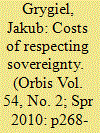

|
|
|
|
|
| Publication |
2010.
|
| Summary/Abstract |
Respect for sovereignty can be an effective tool to manage relations between states, drawing boundaries of acceptable behavior. But there are also clear costs of respecting sovereignty. A foreign policy based on a principled defense of sovereignty can be, in fact, morally wrong, politically illegitimate, and strategically dangerous. This does not mean that sovereignty should be broken wantonly, but only that prudential judgment must be exercised to weigh the costs and benefits of respecting the sovereignty of a state. In the end, our security and our values, not the principle of sovereignty, should be the metric by which we should judge the necessity and legitimacy of U.S. actions.
|
|
|
|
|
|
|
|
|
|
|
|
|
|
|
|
| 3 |
ID:
093923
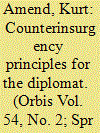

|
|
|
|
|
| Publication |
2010.
|
| Summary/Abstract |
The recent resurgence of interest in insurgency and counterinsurgency has revealed a deficit in material written by and for the diplomat, the actor ostensibly responsible for the political component of a counterinsurgency campaign. Classical theorists stress that progress along the political track is essential for ultimate success. Recent commentary, in shedding new light on the characteristics of modern insurgencies, reaffirms this principle. To make political headway the diplomat-counterinsurgent needs to develop a strategic narrative, build a political strategy around the narrative, acquire expertise, become a catalyst for political change, and maximize contact with the local population. In doing so, he will make important contributions to and help accelerate success in a counterinsurgency campaign.
|
|
|
|
|
|
|
|
|
|
|
|
|
|
|
|
| 4 |
ID:
093945


|
|
|
|
|
| Publication |
2010.
|
| Summary/Abstract |
The casual media observer might well believe that nuclear terrorism is highly likely in the United States and it is a question of "when, not if." This is the view of the "conventionalists." But there is a second school, the "skeptics," that believes the nuclear world is more secure than at any time in history and that the possibility of a nuclear terrorist event is overstated. This article articulates arguments made by these two schools of thought and develops a framework for analyzing the issue. It concludes that while enhanced national and international vigilance against nuclear terrorism is necessary, when viewed through an historical lens, today's margin of nuclear safety may actually be higher than in the past.
|
|
|
|
|
|
|
|
|
|
|
|
|
|
|
|
| 5 |
ID:
093921
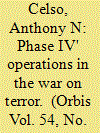

|
|
|
|
|
| Publication |
2010.
|
| Summary/Abstract |
This article identifies the obstacles and prospects of implementing President Obama's surge strategy in Afghanistan by examining four issues: (1) the origins and implementation of the Iraq surge policy; (2) U.S. counterinsurgency operations in Afghanistan; (3) a comparative examination of Afghan and Iraqi tribal insurgent structures; and (4) suggestions for a counter insurgency policy more in sync with regional social and tribal structures.
|
|
|
|
|
|
|
|
|
|
|
|
|
|
|
|
| 6 |
ID:
093924


|
|
|
|
|
| Publication |
2010.
|
| Summary/Abstract |
This history of intelligence contracting in the United States is in many ways the story of American intelligence itself. For all the current criticism of this "new post-9/11 industry," intelligence contracting pre-existed the creation of formal intelligence bureaucracies and gradually developed from alliance-based intelligence sharing and ad-hoc individual agreements into the increasingly private and corporate companies of today. Most of the criticisms of the field are similarly rooted in history: over the ages, some have been legitimate and others less so. Ultimately, when viewed in context, however, intelligence contracting is not nearly as dark or nefarious as is typically portrayed, but rather has been and continues to be a pillar of American intelligence production.
|
|
|
|
|
|
|
|
|
|
|
|
|
|
|
|
| 7 |
ID:
093944


|
|
|
|
|
| Publication |
2010.
|
| Summary/Abstract |
Despite the manifold problems in Russian Defense Minister Anatoliy Serdyukov's radical reform agenda, there is clear evidence that such a program is being implemented regardless of opposition from those in uniform, especially on the General Staff. It is no exaggeration to suggest that depending on how fully it is implemented, this reform could have an impact on the lives of all Russian officers no matter where they serve now. The mass mobilization principle has been abandoned and the transition from a division-based system to the new brigade structure is complete. Meanwhile, despite careful planning by the General Staff, we do not believe the Russian military will emerge as a modern fighting force until 2020, if then. Budget cuts, production inefficiencies, poor maintenance and sloppy work will all inhibit the construction of a modern Russian army.
|
|
|
|
|
|
|
|
|
|
|
|
|
|
|
|
| 8 |
ID:
093922


|
|
|
|
|
| Publication |
2010.
|
| Summary/Abstract |
Strategy is matching means and ends. If the ends desired in Afghanistan are about al Qaeda, the counterterrorism option is the best fit in terms of means. It is sustainable, always crucial in prolonged conflict, as it limits the expenditure of U.S. blood and treasure. This article fills a gap in the existing strategy debate by detailing what a counterterrorism option would be in terms of force structure and operations.
|
|
|
|
|
|
|
|
|
|
|
|
|
|
|
|
| 9 |
ID:
093946
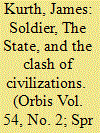

|
|
|
|
|
| Publication |
2010.
|
| Summary/Abstract |
The major military challenge that the United States faces today is the war in Afghanistan. The U.S. military is engaged in a grueling counterinsurgency campaign against the Islamist movement known as the Taliban, which is based among Pashtun tribes in Southeastern Afghanistan and Northwestern Pakistan, who have never been permanently subdued by a foreign military force. This challenge comes in the wake of that other grueling counterinsurgency war that the U.S. military has had to conduct in Iraq, where its chief adversary was the Islamist movement known as al Qaeda in Mesopotamia. Moreover, the challenge in Afghanistan comes on what could be the eve of an impending military challenge, perhaps even a war, with Iran, as that Islamist state relentlessly moves toward acquiring nuclear weapons. In its entire history of two- and-a-quarter centuries, the United States has never been engaged in an unbroken succession of three wars, in three different countries. Together, the U.S. wars with or within Islamist countries add up to what is a "long war," indeed.
|
|
|
|
|
|
|
|
|
|
|
|
|
|
|
|
| 10 |
ID:
093942


|
|
|
|
|
| Publication |
2010.
|
| Summary/Abstract |
The United States has been deeply involved in Latin American affairs for over a century, but promoting democracy has only recently become a priority. The end of the Cold War presented a unique opportunity to provide greater support for democracy in the Western Hemisphere. This article examines the main multilateral and bilateral actions undertaken by the United States to promote democracy in Latin America in recent decades. It makes use of a newly available dataset that specifies the investment made on democracy in different countries and sectors between 1990 and 2005. It also addresses the challenges that the United States confronts in promoting democracy in the region at the current time and the possible scenarios for the near future.
|
|
|
|
|
|
|
|
|
|
|
|
|
|
|
|
|
|
|
|
|